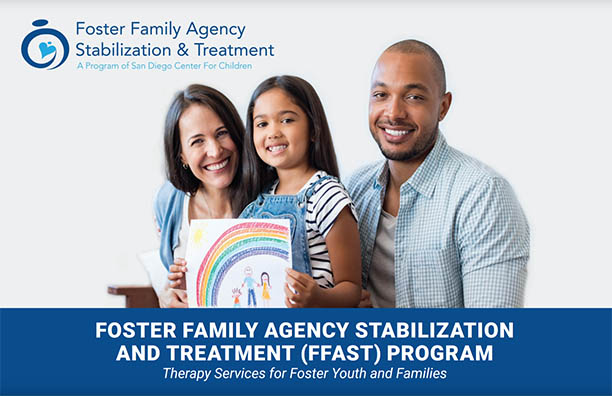Overview
The Foster Family Agency Stabilization and Treatment (FFAST) Program is the sole provider contracted with the County of San Diego Behavioral Health Services to provide therapy and other supportive services to youth, ages 0 to 21, who live in Foster Family Agency (FFA) homes in San Diego County.
FFAST Program Services
Service Approach
- Short-term treatment provided in the home or community
- Short wait times, urgent referrals accepted, and emergency response available
- Family voice and choice driven, and collaborative with Child and Family Team members
Counseling Services & Therapeutic Activities
- Comprehensive trauma-informed behavioral health assessments
- Family and individual therapy provided in the home or community
- Monthly Caregiver Support Group with child care provided
- Trauma-Focused Cognitive Behavioral Therapy (TF-CBT), Motivational Interviewing (MI), Parent-Child Interaction Therapy (PCIT) PRIDE skills, and Positive Discipline (PD)
- Intensive Care Coordination (ICC), Intensive Home Based Services (IHBS), and discharge planning
- Psychiatry and medication management
- Crisis intervention available 24/7
Community Resources & Collaboration
- Connection to FFAST Family Therapists, Family/Youth Support Partners, and Skills Trainers
- Close coordination with Foster Family Agencies and Child Welfare Services
- Connection to community programs and resources
Importance of Active Family Participation
Active Family Participation Supports
- Increased placement stability and permanence
- Quicker response to treatment interventions
- Improved child and caregiver well-being and satisfaction
- Bonding between children and their caregivers
- Improved family communication and problem solving
- Caregivers learning how to best support their youth
- Safety in the home
The participation of a child’s caregiver is vital during the entire treatment process. Caregivers are expected to work with their family’s therapist, attend regular family therapy sessions, provide space for home sessions, and reinforce skills learned in therapy.
Transition age youth are provided the option to invite significant others to be involved in their own treatment if caregivers are not available.
Support System for Caregivers & Foster Youth
Our years of experience as the exclusive provider of mental health services to youth in San Diego County FFA homes has shown us that the best outcomes happen when youth and their families are supported, informed, empowered, and connected.
Families are encouraged to take advantage of the expertise of our Family Support Partners and Skills Trainers who have experience and training in navigating the foster care, juvenile justice, and special education systems.
Our expert team members partner with caregivers and youth to help them understand these systems, advocate for themselves, strengthen their skills, and access needed community resources.
Benefits to Caregivers
- A trusted person to talk to about struggles and stress
- Guidance in navigating and understanding systems (Child Welfare Services, Probation, Education, Behavioral Health Services)
- Facilitate access to community resources (tutoring, after-school programs, housing, food, employment, parenting classes, support groups)
- Help in understanding the processes of reunification or adoption
- Support with parenting skills (communication, discipline, understanding development)
- Assistance with advocacy for self and child
Benefits to Foster Youth
- One-on-one mentorship
- Support in meetings with social workers, therapists, and lawyers
- Connection to community resources (camps, sports, support groups)
- Guidance through stressful life transitions
- Assistance with Independent Living Skills
- Opportunities to learn and practice coping skills in their home, school, and community
Our Treatment Approach & Process
We understand that each child and family has their own needs and must be provided with personalized services for their identified strengths and goals. FFAST works with each family to develop individualized goals that will help support success during and after treatment.
Depending on a family’s needs, services typically last 6 to 12 months. The length of treatment depends on progress made, active family participation, youth and family preferences, and recommendations by FFAST.
Regular communication between the FFAST treatment team and a family allows for proper monitoring of progress and evaluation for continued services as needed.
Individual & Family Therapy (2-4 meetings per month)
- FFAST Family Therapist meets with the family and child to assess their needs and set goals together
- Recommendations are provided for the most appropriate type of therapy, frequency, and the family members who should be involved
Initial Assessment & Treatment Planning (3-4 meetings total)
- Transition age youth who live independently are encouraged to invite their supports into therapy when appropriate (significant other, family member, their own child, etc.)
- Active participation in therapy from youth and caregivers promotes significant growth and healing
Child & Family Team (CFT) Meetings (quarterly or more often as needed)
- Meetings include youth, their family, formal supports (therapist, teachers, social workers, etc.) and informal supports chosen by the youth and family (extended family, clergy, coaches, etc.)
- Discussions consist of significant supports coming together to share what is going well, voice concerns, plan for permanency, review services currently in place, and identify additional supports as needed
A variety of therapeutic approaches are used based on the needs of each family and may include traditional talk therapy, play therapy, art, hands-on coaching in the community, and other non-traditional approaches that are effective and evidence-informed. We are dedicated to having youth and families feel comfortable, and actively engaged throughout their treatment process.
Contact our FFAST Program
Address
San Diego Center for Children
Foster Family Agency Stabilization and Treatment (FFAST) Program
2655 Camino del Rio North, Suite 450
San Diego, CA 92108Main Line
After-Hours Crisis Line
Si necesita ayuda para su hijo(a) o tiene preguntas, llámenos al (858) 838-0796.
